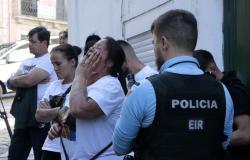Cape Verde wants to nominate the former Tarrafal concentration camp to UNESCO by 2026, in a process that involves Portugal, Angola and Guinea-Bissau and which hopes to “balance” the continental distribution of the world heritage list.
“Of the current list of sites classified as world heritage, only 8% are African”, highlighted the president of the Cape Verdean Institute of Cultural Heritage (IPC), Samira Baessa, during the presentation of the country’s strategy for the site’s candidacy for Heritage Worldwide.
The candidacy will take place in the cultural category and will be the first transnational – bringing together other countries – from an African site. To this end, the country has already sent a memorandum of understanding to Portugal, Angola and Guinea-Bissau, which hopes to be signed by May 10, when the celebrations of the 50th anniversary of the 25th of April and the closure of the Tarrafal Concentration Camp end.
A candidacy of the “people”
In addition to the international “dialogue”, Cape Verde wants to involve civil society so that the candidacy is “for the people” and to honor former political prisoners.
“The hard work will be proving that the site has value that goes beyond national borders”stressed the president of the IPC, cited by the Lusa agency, estimating that the dossier could be submitted to UNESCO between 2025 and 2026.
“It will be a relatively complex and long process”, warned Samira Baessa, stressing that it will be a “winning candidate” and that it will “value the memory”.
The president of the IPC pointed out as “basic conditions” of the candidacy, the classification of the site as a national heritage site in 2004, its inclusion on the indicative list of UNESCO heritage sites, as well as its rehabilitation and museumization and the “convergence of will” with the four countries.
50 years since the liberation of Tarrafal
The presidents of Cape Verde, Angola, Guinea-Bissau and Portugal, the four countries of origin of the prisoners, celebrate on May 1st the 50th anniversary of the liberation of Tarrafal – a memorial plaque at the site marks the names of the 36 killed by the Portuguese colonial dictatorship .
The majority, 32 dead, were Portuguese who challenged the fascist regime, imprisoned in the first phase of the camp, between 1936 and 1956. It reopened in 1962 under the name Camp de Trabalho de Chão Bom, intended to incarcerate anti-colonialists from Angola, Guinea-Bissau and Cape Verde – and where two Angolans and two Guineans died.
In total, more than 500 people were imprisoned in the “slow death camp”.
Portugal supports candidacy
In June 2022, the then Minister of Culture, Pedro Adão e Silva, guaranteed that Portugal would technically support the candidacy process, recalling the importance and “trauma” of that space for both countries.
“It is a project that unites us in the sense that memory does not normally unite two countries. Because Tarrafal corresponds to the history and memory of the fight against the Portuguese dictatorship, it also corresponds to the memory of the fight against colonialism. And both the dictatorship and the colonialist past were resolved in a certain way with the transition to democracy in Portugal and it is extremely important for us to project the future, to always preserve the memory”, stated Pedro Adão e Silva.
Tags: Cape Verde Tarrafal field slow death candidate World Heritage
--




